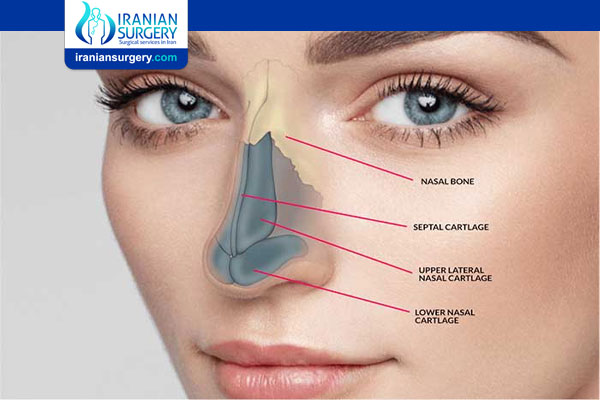How Long Does the Pain Last After Rhinoplasty?
How Long Does the Pain Last After Rhinoplasty?
The prospect of getting a new nose can be exciting. In fact, a new nose can give you a whole new sense of confidence, bringing your features into greater harmony with one another and subtly yet significantly altering your appearance. But here at Iranian Surgery, clients usually ask us, do nose jobs hurt and if so how long does the pain last?
Understanding Rhinoplasty
Before we can talk about whether and for how long you will feel pain after a nose jobs, it’s important to lay some groundwork.
There are different kinds of nose job procedures that can be performed, but the one that’s most common is what’s called an open rhinoplasty. This involves a small incision between the nostrils, which allows the surgeon to remove the skin from the substructures and adjust the cartilages underneath, after which point the skin can be laid back in place.
The open rhinoplasty is a fairly routine procedure for us, and in fact, it’s done on an outpatient basis; you can have a nose job in the morning and be back home, resting and recovering, by afternoon. There is anesthesia administered during the surgery itself, which means patients “go under” while the surgeon works. To that end, there is no pain experienced during the rhinoplasty itself.
But what about afterward? When patients ask us do nose jobs hurt, they’re asking not just about what happens in the surgical suite, but also how they’re going to feel in the hours, days, and weeks that follow. It is important to have clear expectations about the rhinoplasty recovery process, and about steps you can take to minimize pain and discomfort.
Rhinoplasty Pain During Recovery
During recovery from a nose job, it’s very normal to experience swelling, bruising, and potentially even some minor bleeding from the nose. But what about pain? Actually, here at Iranian Surgery most of our patients tell us that the pain is fairly mild. It’s more accurate to discuss rhinoplasty recovery in terms of discomfort, specifically the discomfort caused by congestion.
That’s what patients should expect when they wake up from the anesthesia: Your nose will feel completely “plugged up,” forcing you to breathe through your mouth. This will last for a few days. You’ll also have trouble smelling, and you will likely feel some pressure in your ears or your temples. Again, you can think of it like a very severe case of nasal congestion.
Along the same lines, it’s worth noting that rhinoplasty patients will have some packing in their nose when they wake up, specifically some soft Vaseline and gauze. This may contribute even more to that “congested” feeling, but the packing easily slides out the next day. Once this packing comes out, typically within 24 hours of the surgery, you’ll immediately start to feel a lot more comfortable and a lot less stuffy.
How to Minimize the Discomfort of a Nose Job
As we’ve seen, nose jobs usually aren’t very painful, though some clients may report some tenderness or some aches due to that congestion and sinus pressure. Your surgeon will be able to talk with you in advance about some pain management options, and to provide you with a prescription you can fill for pain relief. By all means ask your surgeon about this during the initial consultation, and make sure all your questions have been addressed to your satisfaction. With that said, many patients never even use the pain medication prescribed, and approved over-the-counter remedies can sometimes do the job.
A bigger issue might be dealing with the discomfort caused by that nasal congestion. One important suggestion is to sleep with your head elevated for the first few days following surgery. This can help you get back to breathing like normal a little quicker.
Something else we recommend to our patients at Iranian Surgery is purchasing a small humidifier that you can run by your bed while you rest and recover. Not only can this soothe your nasal passages, but it can also appease your throat, which may get a little dry from breathing through your mouth during those first couple of days.
Speaking of which, a lot of patients actually tell us that the dry throat and dry lips are among the most severe side effects. Before your surgery, make sure you stock up on some honey and tea, as well as some Chapstick. Staying hydrated during the recovery can also be helpful.
And of course, rest is as important as anything. You’ll likely have some discomfort and possibly some minor pain during those first couple of days, but the more you’re able to take it easy, the more quickly you’ll bounce back and start feeling like yourself again.
About Iranian Surgery
Iranian surgery is an online medical tourism platform where you can find the best plastic and cosmetic surgeons in Iran. The price of Rhinoplasty in Iran can vary according to each individual’s case and will be determined by an in-person assessment with the doctor.
For more information about the cost of Rhinoplasty in Iran and to schedule an appointment in advance, you can contact Iranian Surgery consultants via WhatsApp number 0098 901 929 0946. This service is completely free.
Source:
https://www.charlotteplasticsurgery.com/rhinoplasty-do-nose-jobs-hurt/


